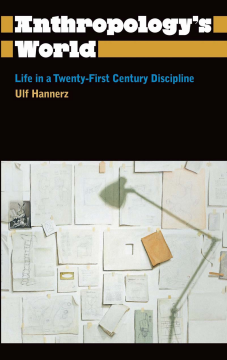
Additional Information
Book Details
Abstract
In this masterly, state of the art work, Ulf Hannerz maps the contemporary social world of anthropologists and its relation to the wider world in which they carry out their work.
Raising fundamental questions such as 'What is anthropology really about?', 'How does the public understand, or misunderstand, anthropology?' and 'What and where do anthropologists study now, and for whom do they write?', Hannerz invites anthropologists to think again about where their discipline is going.
Full of insights and practical advice from Hannerz's long experience at the top of the discipline, this book is essential for all anthropologists who want their craft to survive and develop in a volatile world, and contribute to new understandings of its ever-changing diversity and interconnections.
'Widely admired as a leading anthropologist of globalisation, Hannerz shows how anthropology came to be a central intellectual discipline, and why it should stay that way in a globalised world where the local refuses to be beaten into submission'
Thomas Hylland Eriksen is Professor of Social Anthropology at the University of Oslo. He is the author of numerous books, including Ethnicity and Nationalism, A History of Anthropology, Small Places, Large Issues, Tyranny of the Moment and Globalisation, all available from Pluto Press
'Ulf Hannerz takes readers behind-the-scenes with wit, insight, political acuity, and a good measure of humanity. His observations about the frequent privileging of English in today's 'global discipline' and its consequences are especially sharp'
Virginia R. Dominguez, President, American Anthropological Association, Edward William and Jane Marr Gutgsell Professor of Anthropology, University of Illinois at Urbana-Champaign, and Co-Founder and Consulting Director, International Forum for U.S. Studies
Table of Contents
| Section Title | Page | Action | Price |
|---|---|---|---|
| Cover | Cover | ||
| Contents | v | ||
| Acknowledgments | vi | ||
| Series Preface | vii | ||
| 1. Introduction: In the World, and a World in Itself | 1 | ||
| 2. Editing Anthropology: Two Experiences in Space and Time | 13 | ||
| 3. Diversity Is Our Business | 38 | ||
| 4. Field Worries: Studying Down, Up, Sideways, Through, Backward, Forward, Early or Later, Away and at Home | 59 | ||
| 5. Making the World Transparent | 87 | ||
| 6. Flat World and the Tower of Babel: Linguistic Practices in a Global Discipline | 113 | ||
| 7. Before and After: Exploring the Usable Past | 131 | ||
| 8. And Next, Briefly: Toward 2050 | 161 | ||
| Notes | 167 | ||
| References | 184 | ||
| Index | 199 |
